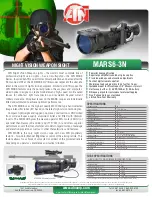
5
THE ALTAZIMUTH MOUNT
This telescope is fitted with an Altazimuth mount. “Altitude" refers to the vertical movement of the
telescope, while "Azimuth" refers to the horizontal movement.
ABOUT MAGNIFICATION
The magnification power of a telescope indicates how much an image is enlarged or how big and
close it appears to the viewer. The focal length of the eyepiece, combined with the focal length of the
telescope, determine the magnification power. To calculate the power of your telescope with any
particular eyepiece, simply divide the focal length of the telescope (360mm) by the focal length of
the eyepiece (indicated in “mm” on the eyepiece collar).
Example
: 360mm focal length (tube) = 18X magnification power
20mm focal length (eyepiece)
The two interchangeable eyepieces included, provide the following magnification powers:
Eyepiece
Power
20mm
18X
4mm
90X
The level of magnification required depends on the object being observed.
A lower magnification power with a wider field of view is advisable for observing galaxies and
nebulae. Higher magnification powers should only be used for highly detailed observations of the
moon, Jupiter, and Saturn, or any object that is extremely bright
USING YOUR TELESCOPE FOR ASTRONOMICAL VIEWING:
1) Take your telescope outside. Viewing objects through closed or open windows is not
recommended. Your view can be distorted by reflections in the glass of a closed window or by air
currents, of differing temperatures, passing through an open window.
2) Let your telescope adjust to the outside temperature. Your telescope will perform much better if
the lenses and the air inside the tube are the same temperature as outside. It may take up to 30
minutes to equalize the temperatures when the difference in temperatures is extreme.
3) Find a location far from glaring light. If you live in an urban area, your viewing will probably
improve the farther you move away from the city lights. The skyglow of a town or city can
dramatically reduce the telescope’s performance and viewing capabilities.
When possible, avoid sudden temperature changes, as the moisture in the air will condense on the
objective lens. Should this occur after bringing your telescope inside, leave the lens cap off the


























